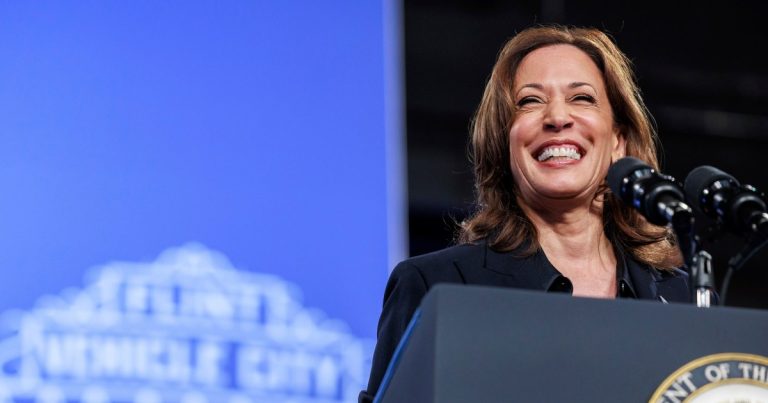
Vice President Kamala Harris speaks at a rally in Flint, Michigan, October 4, 2024.Andrew Ross/Sipa US/AP
on tuesday, Vice President Kamala Harris announced on The View that she will pursue a new Medicare benefit that would cover the cost of home care for eligible people with disabilities and those over 65.
For more than half a century, people with disabilities have fought for the right to remain in their homes and communities, rather than being institutionalized. This includes any support they may need, such as a home care worker. A recent poll released by the University of Michigan found that about 3 in 5 people over 50 who have a caregiver also have a physical disability. Medicare already covers home health care for some people, but it's much harder to get it in a very limited way.
“Not having access to these services can result in unnecessary institutionalization.”
I spoke to Nicole Jowick, director of advocacy and campaigns at Caring Across Generations, about Harris' new proposal, what it means to be eligible if she's elected, and what the benefits would be. We talked about what it takes to be successful.
Why are you excited about Harris' plan to expand Medicare?
The Harris administration's plan to include home health care and Medicare coverage is truly transformative for people with disabilities and seniors. This proposal is of interest not only to those who can receive the care they need, but also to those who would be affected by their inability to provide that care themselves.
The most exciting thing about this for me is what I hear when I go out and meet people in the care advocacy community is that so many people think Medicare is already doing this. That's it. It would be a huge boon to the government-funded system that people already thought they had, and it would solve problems that many people didn't even know they had until they were in crisis.
How can we help people with disabilities live at home rather than in facilities such as nursing homes or group homes?
Ninety-five percent of people with disabilities prefer to live in their own homes or communities. But the reality is that accessing these services requires remaining poor, as Medicaid has traditionally been the primary funder of these services. Waiting lists also exist because states can limit the number of people they serve.
Adding home care to Medicare could mean that more of the 7 million disabled people (12% of Medicare beneficiaries) currently eligible for Medicare would not have to wait for services. It means not (not necessary). If these services are not available, people may be institutionalized unnecessarily. This proposal to add home health care to Medicare would also relieve some pressure on the Medicaid system. We hope to continue to pull people off the waiting list and remove the institutional bias that currently exists.
Why is it also important to address the nursing staff shortage for such plans to be successful?
Anyone who needs home care will have those services provided by direct care workers, and we are in a direct care worker crisis. It's not because we don't have enough people, it's because we don't have enough quality direct care jobs. The proposal also includes ensuring that the people who provide these Medicare services are paid adequately.
Disability Advocates and Aging Advocates, the opportunity to implement policies like this, which must pass Congress, will ensure that all direct care workers, paid or not, can make ends meet. It also ensures that the policy is implemented in parallel with the investment made. Medicaid or Medicare provides a family-supporting wage. For this program to be successful, we must also address the direct care workforce – the human infrastructure, the people who actually provide the services.
Now we're thinking about direct support professionals and home care workers, people who don't have immediate access to home care as they get older unless they qualify for Medicaid, which could lead to waiting lists. It is known that there is a sex. Vice President Harris' proposal to add home care to Medicare would ensure that historically low-paid direct care workers have peace of mind when they need home care.
Are there any examples of programs similar to the one Harris is proposing being implemented at the state level?
While we don't necessarily see states adding to federal programs, there are some examples of states investing in people in the country who need a little extra help. There was a program passed under the Affordable Care Act called the Community First Choice Option. States such as Oregon and Texas that adopt this option would be required to provide home- and community-based care to eligible individuals, primarily through personal care assistance, in the same manner as Vice President Harris' proposal. are.
For those on the waiting list, there is only a small benefit. We know that if we provide some benefits right when people need them, we can probably prevent them from needing long-term care in the future.
Are there lessons to be learned from implementing the Community First Choice Option at the state level?
When implementing a program like the Community First Choice Option at the state level, an important consideration is that you want as much flexibility as possible. We need to ensure that the services provided meet the unique needs of older people and people with disabilities who require care. You also need to make sure that your definition of workforce is broad enough. There may be people with disabilities who you want to be your family, or people with disabilities who you want to be your spouse. You can't just throw more people into the system without also addressing the workforce.
This interview has been edited for length and clarity.

